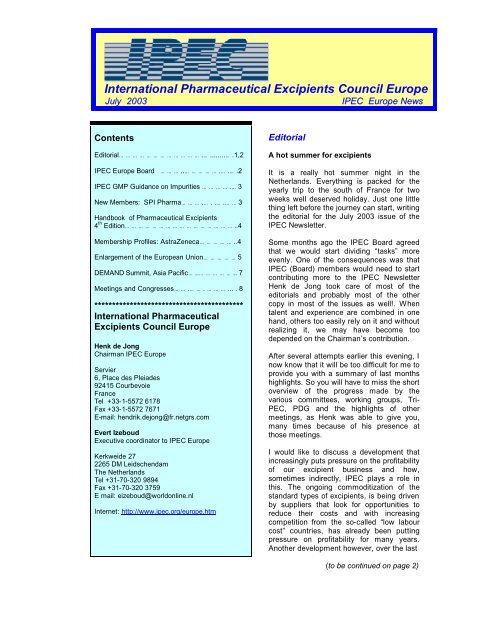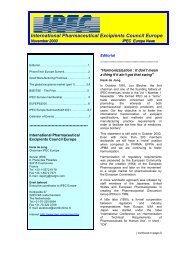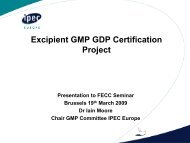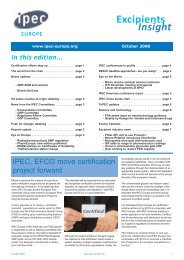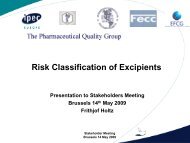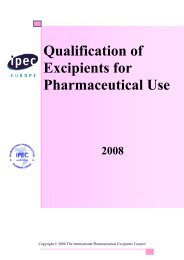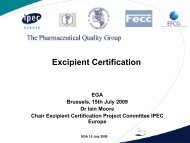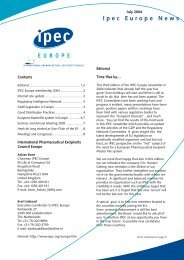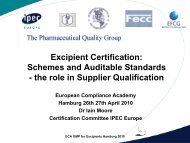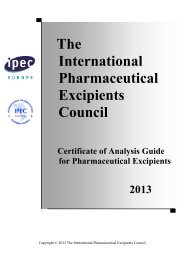International Pharmaceutical Excipients Council ... - IPEC Europe
International Pharmaceutical Excipients Council ... - IPEC Europe
International Pharmaceutical Excipients Council ... - IPEC Europe
Create successful ePaper yourself
Turn your PDF publications into a flip-book with our unique Google optimized e-Paper software.
<strong>International</strong> <strong>Pharmaceutical</strong> <strong>Excipients</strong> <strong>Council</strong> <strong>Europe</strong><br />
July 2003<br />
<strong>IPEC</strong> <strong>Europe</strong> News<br />
Contents<br />
Editorial… …………………………….… ........… .1,2<br />
<strong>IPEC</strong> <strong>Europe</strong> Board ………..… ………….… .… .2<br />
<strong>IPEC</strong> GMP Guidance on Impurities … ……….… 3<br />
New Members: SPI Pharma… …….… . .… .… …3<br />
Handbook of <strong>Pharmaceutical</strong> <strong>Excipients</strong><br />
4 th Edition… ………………………………………..4<br />
Membership Profiles: AstraZeneca… …………..4<br />
Enlargement of the <strong>Europe</strong>an Union… …………5<br />
DEMAND Summit, Asia Pacific… ..… ………….. 7<br />
Meetings and Congresses… ….… …. … ……... . 8<br />
******************************************<br />
<strong>International</strong> <strong>Pharmaceutical</strong><br />
<strong>Excipients</strong> <strong>Council</strong> <strong>Europe</strong><br />
Henk de Jong<br />
Chairman <strong>IPEC</strong> <strong>Europe</strong><br />
Servier<br />
6, Place des Pleiades<br />
92415 Courbevoie<br />
France<br />
Tel +33-1-5572 6178<br />
Fax +33-1-5572 7671<br />
E-mail: hendrik.dejong@fr.netgrs.com<br />
Evert Izeboud<br />
Executive coordinator to <strong>IPEC</strong> <strong>Europe</strong><br />
Kerkweide 27<br />
2265 DM Leidschendam<br />
The Netherlands<br />
Tel +31-70-320 9894<br />
Fax +31-70-320 3759<br />
E mail: eizeboud@worldonline.nl<br />
Internet: http://www.ipec.org/europe.htm<br />
Editorial<br />
A hot summer for excipients<br />
It is a really hot summer night in the<br />
Netherlands. Everything is packed for the<br />
yearly trip to the south of France for two<br />
weeks well deserved holiday. Just one little<br />
thing left before the journey can start, writing<br />
the editorial for the July 2003 issue of the<br />
<strong>IPEC</strong> Newsletter.<br />
Some months ago the <strong>IPEC</strong> Board agreed<br />
that we would start dividing “tasks” more<br />
evenly. One of the consequences was that<br />
<strong>IPEC</strong> (Board) members would need to start<br />
contributing more to the <strong>IPEC</strong> Newsletter<br />
Henk de Jong took care of most of the<br />
editorials and probably most of the other<br />
copy in most of the issues as well!. When<br />
talent and experience are combined in one<br />
hand, others too easily rely on it and without<br />
realizing it, we may have become too<br />
depended on the Chairman’s contribution.<br />
After several attempts earlier this evening, I<br />
now know that it will be too difficult for me to<br />
provide you with a summary of last months<br />
highlights. So you will have to miss the short<br />
overview of the progress made by the<br />
various committees, working groups, Tri-<br />
PEC, PDG and the highlights of other<br />
meetings, as Henk was able to give you,<br />
many times because of his presence at<br />
those meetings.<br />
I would like to discuss a development that<br />
increasingly puts pressure on the profitability<br />
of our excipient business and how,<br />
sometimes indirectly, <strong>IPEC</strong> plays a role in<br />
this. The ongoing commoditization of the<br />
standard types of excipients, is being driven<br />
by suppliers that look for opportunities to<br />
reduce their costs and with increasing<br />
competition from the so-called “low labour<br />
cost” countries, has already been putting<br />
pressure on profitability for many years.<br />
Another development however, over the last<br />
(to be continued on page 2)
<strong>International</strong> <strong>Pharmaceutical</strong> <strong>Excipients</strong> <strong>Council</strong> <strong>Europe</strong><br />
________________________________________________________________<br />
(continued from page 2)<br />
couple of years negatively effecting<br />
profitability for excipient producers is the<br />
increasing regulatory burden enforced by<br />
governmental bodies and indirectly the<br />
pharmaceutical industry.<br />
Each company may look for its own way to<br />
deal with these developments. Alternatives<br />
may be to look for lowering their overall cost<br />
base while others decide to invest in quality,<br />
service or innovation or look for acquisition<br />
candidates to increase critical mass. Which<br />
strategy to follow is each company’s own<br />
responsibility. However there is a mutual<br />
interest to work closely together in some of<br />
the ongoing discussions and initiatives in<br />
this field. Indeed, many such initiatives are<br />
ongoing. The EU for instance is working on<br />
a community code involving a revision of the<br />
legal framework for <strong>Pharmaceutical</strong><br />
Products including excipients. Or think of the<br />
quality regulations now being made by<br />
French government in relation to the<br />
development of excipients. And of course,<br />
many others will be forced upon us in the<br />
coming years!<br />
It is good to realize that we do not have to<br />
deal with these developments each for itself<br />
and that <strong>IPEC</strong> is a body that represents the<br />
interests of both producers and users of<br />
excipients. Discussions on what should be<br />
obligatory or what should be kept voluntary,<br />
or even more important, on what is<br />
appropriate for excipients , can be held in<br />
the safe environment of the <strong>IPEC</strong> working<br />
committees. Subsequently the outcome of<br />
these discussions is translated into position<br />
papers so that regulatory bodies need to<br />
take notice of it.<br />
A good example of such a “combined<br />
approach” is the ongoing discussion on<br />
impurities in excipients in one of <strong>IPEC</strong>’s<br />
working committees. Much effort is made to<br />
make officials see that impurities in<br />
excipients should not be seen with the same<br />
eyes as those in active pharmaceutical<br />
ingredients. Sometimes they are an intrinsic<br />
part of an excipient and the excipient could<br />
not be produced economically without them<br />
and in some cases they even add to the<br />
specific functionality of that excipient. As in<br />
all businesses, producers of excipients need<br />
to decide on the best strategy to achieve<br />
their objectives, and they also need to<br />
realize that some battles are better fought<br />
together within <strong>IPEC</strong> than alone. This is<br />
probably the only guarantee to avoid that we<br />
all are faced with unrealistic regulatory<br />
demands. I invite you to read on the<br />
progress made in this field by some of the<br />
working groups.<br />
Herman Ermens<br />
<strong>IPEC</strong> <strong>Europe</strong><br />
During the Board Meetings in April and June<br />
2003 the Board discussed the various<br />
responsibilities of the Board members.<br />
<strong>IPEC</strong> <strong>Europe</strong> Board<br />
Name Period Responsibility<br />
Mrs Patricia<br />
Rafidison<br />
Mr Carl<br />
Mroz<br />
Mr Adrian<br />
Bone<br />
Mr Henk de<br />
Jong<br />
Mr Herman<br />
Ermens<br />
Mr Johnny<br />
Pallot<br />
Mr Michel<br />
Malandain<br />
2003-<br />
2006<br />
2001-<br />
2004<br />
2003-<br />
2006<br />
2003-<br />
2006<br />
2002-<br />
2005<br />
2002-<br />
2005<br />
GMP/Communication<br />
Symposia<br />
Regulatory Affairs<br />
Chair (till 2004)<br />
Secretary<br />
Communication<br />
Internet /Membership<br />
affairs<br />
Treasurer<br />
Board Election 2004, call for candidates<br />
During the Annual General Meeting in 2004<br />
Mr Carl Mroz will end his term as member of<br />
the <strong>IPEC</strong> <strong>Europe</strong> Board. Mr Mroz will not<br />
July Jul<strong>IPEC</strong> J JulJuly 2003<br />
_____________________________________________________________________<br />
<strong>IPEC</strong> <strong>Europe</strong> News 2
<strong>International</strong> <strong>Pharmaceutical</strong> <strong>Excipients</strong> <strong>Council</strong> <strong>Europe</strong><br />
________________________________________________________________<br />
stand for re-election and therefore the Board<br />
invites the <strong>IPEC</strong> <strong>Europe</strong> membership (user<br />
category) to put forward candidates for<br />
fulfilling the vacancy for the period 2004 to<br />
2007. Detailed information about the<br />
vacancy can be obtained by contacting Mr<br />
Henk de Jong.<br />
<strong>IPEC</strong> <strong>Europe</strong> GMP Guidance<br />
Draft <strong>IPEC</strong> Guidance document on<br />
defining and monitoring impurities<br />
<strong>IPEC</strong> <strong>Europe</strong>’s Working Group on impurities<br />
for pharmaceutical excipients has elaborated<br />
a draft guidance document on impurities in<br />
pharmaceutical excipients. Below is a<br />
summary of the contents.<br />
The guide provides an approach for<br />
establishing an impurity profile for existing<br />
pharmaceutical excipients. An impurity<br />
profile may be mainly used for regulatory<br />
purposes, quality consistency,<br />
manufacturing process monitoring, change<br />
control, product specification setting and as<br />
a base for safety evaluation by the excipient<br />
suppliers.<br />
recommended” does not mean “must” and<br />
common sense must be used in the<br />
application of this guide.<br />
The guide is divided into several sections.<br />
The first part provides background<br />
discussion necessary for considering the<br />
nature and origin of impurities and<br />
contaminants found in the pharmaceutical<br />
excipient. A section that contains guidance<br />
on establishing an impurity profile follows<br />
this. The final section contains definitions<br />
and references to other documents and<br />
websites useful in developing an impurity<br />
profile.<br />
The next step will be reaching consensus<br />
about the contents with our American<br />
colleagues in order to obtain an <strong>IPEC</strong><br />
guidance document.<br />
New <strong>IPEC</strong> <strong>Europe</strong> members<br />
During the Board meeting on April 11 th 2003<br />
the application of the French company SPI<br />
Pharma was endorsed. Below is the<br />
company profile of SPI Pharma (source:<br />
Internet site of SPI Pharma).<br />
The guide should be of international<br />
application, bearing in mind that<br />
pharmaceutical excipients are diverse and<br />
often have uses other than pharmaceutical<br />
applications. An excipient is often used with<br />
a broad range of active pharmaceutical<br />
ingredients and in a diverse range of<br />
finished dosage forms. As an international<br />
guidance document, it does not specify legal<br />
requirements nor cover particular<br />
characteristics of every excipient. In<br />
addition, current guidelines like ICH<br />
Impurities for New Drug Substances do not<br />
apply to existing excipients and novel<br />
excipients which are by nature and definition<br />
pharmacologically inactive ingredients and<br />
should not be subjected to the same<br />
standards. When implementing this guide,<br />
each manufacturer must consider how it<br />
may apply to his products and processes.<br />
The diversity of excipients means that some<br />
principles of the guide may not be applicable<br />
to certain products and processes. The<br />
terminology “should” and “it is<br />
SPI Pharma is an important supplier of<br />
custom formulation solutions for<br />
pharmaceutical and nutriceutical<br />
manufacturers. By offering raw materials,<br />
processing capabilities, and advanced<br />
application technologies SPI has become a<br />
valued source for complete custom delivery<br />
systems.<br />
SPI Pharma is an Associated British Foods<br />
company.Their product scope includes<br />
excipients, antacid actives, and formulated<br />
systems. All products are produced under<br />
appropriate manufacturing guidelines<br />
suitable for pharmaceutical and<br />
neutriceutical applications.<br />
Their core processing capabilities include<br />
precipitation, hydrogenation, crystallization,<br />
spray drying, granulation, micronization,<br />
July Jul<strong>IPEC</strong> J JulJuly 2003<br />
_____________________________________________________________________<br />
<strong>IPEC</strong> <strong>Europe</strong> News 3
<strong>International</strong> <strong>Pharmaceutical</strong> <strong>Excipients</strong> <strong>Council</strong> <strong>Europe</strong><br />
________________________________________________________________<br />
suspensions, and encapsulation. Some of<br />
advanced applications include solid dosage<br />
formulation, viscous suspensions/blends,<br />
DC chewing gum, effervescent systems,<br />
chewable/quick-dissolve tablets and<br />
customized granulations.<br />
Handbook of <strong>Pharmaceutical</strong><br />
<strong>Excipients</strong>- 4 th Edition 2003<br />
In March 2003 the 4 th Edition of the<br />
Handbook of <strong>Pharmaceutical</strong> <strong>Excipients</strong> was<br />
published. The new edition is a useful guide<br />
to the uses, properties and safety of<br />
pharmaceutical excipients. The 4 th edition is<br />
available both in hard copy as well as on a<br />
CD-ROM.<br />
AstraZeneca PLC has its headquarters in<br />
London with its U.S. base located in<br />
Wilmington, Delaware. Wilmington is also<br />
the global home for the company’s Central<br />
Nervous System (CNS) commercial and<br />
research and development efforts.<br />
AstraZeneca operates nine different R&D<br />
sites and has sales activities in over 100<br />
countries and manufacturing facilities in 19<br />
countries. With 100 years of combined<br />
experience, scientists at AstraZeneca have<br />
discovered and developed several of today’s<br />
leading prescription medicines—<br />
pharmaceuticals that contribute to a higher<br />
quality of life for millions of patients and to a<br />
better health economy worldwide.<br />
The Handbook gives information on about<br />
250 excipients of which 40 are new entries.<br />
<strong>Pharmaceutical</strong> Press<br />
PO 151, Wallingford<br />
Oxon OX10 8QU United Kingdom<br />
Tel: +44(0) 1491 829 272<br />
Fax: +44(0) 1491 829 292<br />
Internet: www.pharmpress.com<br />
<strong>IPEC</strong> <strong>Europe</strong> membership profiles<br />
Under the heading Membership Profiles an<br />
attempt will be made to inform the <strong>IPEC</strong><br />
<strong>Europe</strong> membership about the major<br />
activities (<strong>Excipients</strong>) of the members. In this<br />
issue AstraZeneca, an important user of<br />
pharmaceutical excipients is put in the<br />
spotlight.<br />
AstraZeneca is a major international<br />
research based pharmaceutical company<br />
engaged in the development, manufacture<br />
and marketing of ethical (prescription)<br />
pharmaceutical products. Our long heritage<br />
of innovation and documented ability to<br />
develop new concepts in medicine has<br />
makes this organization one of the top five<br />
pharmaceutical companies in the world.<br />
Based in Sweden, AstraZeneca's R&D<br />
organization is international in scope and<br />
comprised of approximately 10,000<br />
researchers. Through its own resources and<br />
through collaboration with dozens of<br />
universities and strategic alliances with<br />
numerous research and biotechnology<br />
companies, AstraZeneca has broad access<br />
to advanced technologies in biomedical<br />
research, including genomics, bio<br />
informatics, chemical libraries, high<br />
throughput screening and product delivery<br />
systems.<br />
Representative to <strong>IPEC</strong> <strong>Europe</strong><br />
Dr Magnus Erickson, member of <strong>IPEC</strong><br />
<strong>Europe</strong>’s Harmonisation Committee, is<br />
the official contact for AstraZeneca to<br />
<strong>IPEC</strong> <strong>Europe</strong>.<br />
E-mail:<br />
magnus.erickson@astrazeneca.com<br />
July Jul<strong>IPEC</strong> J JulJuly 2003<br />
_____________________________________________________________________<br />
<strong>IPEC</strong> <strong>Europe</strong> News 4
<strong>International</strong> <strong>Pharmaceutical</strong> <strong>Excipients</strong> <strong>Council</strong> <strong>Europe</strong><br />
________________________________________________________________<br />
Enlargement of the <strong>Europe</strong>an Union<br />
Acknowledgement<br />
<strong>IPEC</strong> <strong>Europe</strong> would like to acknowledge<br />
<strong>Pharmaceutical</strong> Marketing for granting<br />
permission to cite from an article of Mrs Zelda<br />
Pickup, published in April 2003. Information<br />
about <strong>Pharmaceutical</strong> Marketing can be found<br />
on the Internet site: http://www.pmlive.com.<br />
---------------------------------<br />
Nine countries have completed their<br />
accession negotiations in time to accede to<br />
the EU during 2004. They are the Central and<br />
Eastern <strong>Europe</strong>an countries of Hungary,<br />
Poland and the Czech and Slovak Republics,<br />
the Baltic States of Estonia, Latvia and<br />
Lithuania, plus Cyprus and Malta. Clearly,<br />
the enlargement of the EU marketplace from<br />
15 countries to 26 will have a significant<br />
impact and provide an entirely new marketing<br />
environment for all sectors, including the<br />
pharmaceutical industry.<br />
As with many other changes, whether the<br />
expansion of the Union is regarded as a<br />
threat or an opportunity depends on a<br />
company's strategies, positioning in the<br />
market and product portfolio. The areas likely<br />
to be most affected by the impact of<br />
accession are cross-border trade, raising<br />
questions of whether parallel imports may<br />
increase as a result of the expansion, and<br />
concerns over the increased availability of<br />
generic products in the marketplace. In<br />
addition, regulatory matters, specifically<br />
compliance with EU regulatory regimes, will<br />
be affected.<br />
Unified market<br />
The basic, free trade principles of EU law<br />
generally already apply between accession<br />
countries and the <strong>Europe</strong>an Union.<br />
This has come about through various Free<br />
Trade and Association agreements that set<br />
out the legal framework by which countries<br />
can meet the economic and political<br />
conditions for EU accession. These<br />
agreements incorporate the principles of free<br />
movement of goods and obligations to uphold<br />
competition law.<br />
For pharmaceutical products, however, the<br />
position is more complex and bears greater<br />
scrutiny here. Essentially, there are<br />
regulatory controls within the EU which<br />
constitute legitimate obstacles to the free<br />
movement of medicinal products from non-<br />
EU countries into the EU. Parallel trade of<br />
drugs between EU member states is only<br />
possible due to equivalent regulatory regimes<br />
in each country. Clearly, countries wishing to<br />
accede to the EU need to match this<br />
regulatory situation.<br />
As part of the accession process, potential<br />
member states have made a commitment to<br />
reach <strong>Europe</strong>an Union standards and<br />
comply with regulatory requirements by the<br />
date of accession (May 1 2004) or by the<br />
end of any agreed transitional period. After<br />
this date, regulatory approvals in accession<br />
countries based on dossiers which do not<br />
comply with EU regulations will lapse.<br />
Where medicinal products are imported from<br />
a third (non-EU) country, these controls may<br />
be relaxed if appropriate arrangements have<br />
been made with the exporting country to<br />
ensure that the manufacturer has applied<br />
standards of good manufacturing practice at<br />
least equivalent to those in the EU.<br />
With labelling and packaging requirements,<br />
all labelling and leaflets must be in the<br />
language of the member state where the<br />
products are to be placed on the market.<br />
Regulatory compliance<br />
The most complex area that will be impacted<br />
by accession is the adoption of EU<br />
regulatory standards. In order to be ready for<br />
accession and able to adopt EU regulatory<br />
standards, the eleven accession countries -<br />
together with the EMEA regulatory body and<br />
the <strong>Europe</strong>an Commission - have entered<br />
into a Collaboration Agreement with Drug<br />
Regulatory Authorities in EU- associated<br />
Countries (CADREAC).<br />
This agreement sets out a simplified<br />
procedure for the granting by the accession<br />
countries of marketing authorisations for<br />
medicinal products, which have already<br />
been authorised using the centralised<br />
procedure within the EU.<br />
(to be continued on page 6)<br />
July Jul<strong>IPEC</strong> J JulJuly 2003<br />
_____________________________________________________________________<br />
<strong>IPEC</strong> <strong>Europe</strong> News 5
<strong>International</strong> <strong>Pharmaceutical</strong> <strong>Excipients</strong> <strong>Council</strong> <strong>Europe</strong><br />
________________________________________________________________<br />
(Continued on page 5)<br />
The agreement aims to assist countries to<br />
implement Community standards,<br />
procedures and good practices, and to<br />
strengthen collaboration with EU bodies and<br />
authorities.<br />
CADREAC has also commenced<br />
harmonisation work on a simplified<br />
authorisation procedure for products that<br />
have been approved under the EU mutual<br />
recognition procedure.<br />
It will only be possible for authorisations<br />
granted in the accession countries to be<br />
mutually recognised by existing member<br />
states once national procedures are<br />
harmonised to EU standards. As part of the<br />
accession process, if existing regulatory<br />
dossiers are not in line with EU standards it<br />
has been agreed that authorisation for the<br />
product should be withdrawn on the day of<br />
accession (or the end of the agreed<br />
transitional period).<br />
Consequently, both regulatory authorities in<br />
accession countries and pharma companies<br />
are working extremely hard to update the<br />
regulatory dossiers of existing products, to<br />
ensure they comply. Five accession<br />
countries (Cyprus, Lithuania, Malta, Poland<br />
and Slovenia) have asked for more time to<br />
complete this process (a transitional period).<br />
The threat of withdrawal of approval raises<br />
some significant questions for those<br />
pharmaceutical companies operating in<br />
accession countries. These include:<br />
• How much extra work and extra data will<br />
be required in order to obtain a new<br />
authorisation complying with the EU<br />
standards?<br />
• How many products will be withdrawn from<br />
the marketplace rather than incur the cost or<br />
dealing with the issue of upgrading the<br />
regulatory dossiers?<br />
It is inescapable that the requirements to<br />
update and standardise all regulatory<br />
dossier is likely to place companies that<br />
already possess EU authorisations (and,<br />
therefore, compliant regulatory dossiers) in a<br />
much stronger position in accession<br />
countries than locally-based manufacturers<br />
or generic suppliers.<br />
Exhaustion setting in<br />
While there are clearly some major<br />
obstacles to parallel trading for accession<br />
countries, once a dossier and resulting<br />
marketing authorisation is EU compliant<br />
parallel importing ought to be possible.<br />
However, nothing relating to parallel imports<br />
is simple and there is an important<br />
distinction between EU and non-EU<br />
countries over the ability to use intellectual<br />
property rights to prevent parallel trade.<br />
Under the doctrine of `exhaustion of rights',<br />
intellectual property rights are said to be<br />
exhausted if the product has been placed on<br />
the market in the <strong>Europe</strong>an Economic Area<br />
(EEA) by the rights holder or a licensee.<br />
Exhausted rights, therefore, cannot be used<br />
to prevent parallel imports of products<br />
between EU member states.<br />
However, these rights are not exhausted,<br />
and can be enforced, relating to products<br />
which have been placed on the market<br />
outside the EU and are being imported into<br />
the EU. As a result of these legal<br />
distinctions, accession would inevitably<br />
affect the legal position on the use of patents<br />
or trademarks to prevent importation from an<br />
accession country into an EU country.<br />
This issue, however, was identified at an<br />
early stage and a mechanism has been<br />
negotiated which protects the intellectual<br />
property rights of patent or supplementary<br />
protection certificate (SPC) holders, which<br />
were in place in the EU at the time when it<br />
was not possible to gain such protection in<br />
the accession state.<br />
Clearly, this mechanism could have<br />
significant impact on the pharmaceutical<br />
industry and parallel trade.<br />
July Jul<strong>IPEC</strong> J JulJuly 2003<br />
_____________________________________________________________________<br />
<strong>IPEC</strong> <strong>Europe</strong> News 6
<strong>International</strong> <strong>Pharmaceutical</strong> <strong>Excipients</strong> <strong>Council</strong> <strong>Europe</strong><br />
________________________________________________________________<br />
It should be noted, however, that the<br />
mechanism will be of no assistance to<br />
companies with products which were<br />
launched after patent protection was<br />
available in the accession countries.<br />
Typically, such patent protection for<br />
pharmaceutical products came in to force<br />
between 1991 and 1994 in most of the<br />
accession countries. If the full five-year<br />
protection of the SPC is available, some<br />
products might enjoy up to 15 years'<br />
protection.<br />
The key dates for this mechanism are:<br />
• The filing date of the patent/SPC in an<br />
existing member state: and<br />
• The date when patent protection became<br />
available in (presumably) the relevant<br />
accession country.<br />
Nevertheless, a considerable number of<br />
products should enjoy a degree of protection<br />
by reliance on these patent and SPC rights.<br />
DEMAND Summit, Asia Pacific<br />
As most pharmaceutical and biotechnology<br />
research and development takes place in<br />
<strong>Europe</strong> and the US, the task carried out by<br />
the industry in Asia, is to manufacture drugs<br />
and medical tools, and distribute them to the<br />
end user. Given the fact that the<br />
pharmaceutical industry is highly competitive,<br />
since most products may now be generically<br />
manufactured, it has become a necessity that<br />
manufacturers and distributors ensure that<br />
their products are made to the highest<br />
standards and distributed to the end user in a<br />
timely fashion.<br />
In order to contribute to this objective the<br />
Congress Organizer Marcus Evans will<br />
organize a two days summit event<br />
(November 9 th -11 th 2003) under the name<br />
DEMAND in Bangkok, Thailand. <strong>IPEC</strong><br />
<strong>Europe</strong> will be represented by its Chairman<br />
Mr Henk de Jong, who will address Quality<br />
issues of <strong>Pharmaceutical</strong> <strong>Excipients</strong>.<br />
EU regulatory requirements<br />
• The accession countries, the EMEA and<br />
the EC have entered into the CADREAC<br />
agreement<br />
• CADREAC sets out a simplified procedure<br />
for the granting of marketing authorisations<br />
for medicinal products<br />
• Authorisations granted in the accession<br />
countries can only be recognised by existing<br />
Member States once national procedures<br />
are harmonised to EU standards<br />
• If regulatory dossiers are not in line with<br />
EU standards, authorisation for the product<br />
should be withdrawn on the day of<br />
accession<br />
• Products which gained IP rights in the EU<br />
before such protection was available in<br />
accession countries will be able to use this<br />
patent protection. If the five-year SPC<br />
protection is available, some products might<br />
enjoy up to 15 years' protection.<br />
Manufacturing and distributing<br />
<strong>Pharmaceutical</strong>s in Asia Pacific<br />
For more information on the Demand<br />
Summit 2003<br />
http://www.demandsummit.com/<br />
html/event.htm<br />
Contact person:<br />
Mrs Jacqueline Chin<br />
jackiec@marcusevanskl.com<br />
July Jul<strong>IPEC</strong> J JulJuly 2003<br />
_____________________________________________________________________<br />
<strong>IPEC</strong> <strong>Europe</strong> News 7
<strong>International</strong> <strong>Pharmaceutical</strong> <strong>Excipients</strong> <strong>Council</strong> <strong>Europe</strong><br />
________________________________________________________________<br />
Meetings and Seminars 2003<br />
Sept 8-9<br />
Swedish Academy co-sponsor <strong>IPEC</strong><br />
<strong>Europe</strong>; 3 rd <strong>International</strong> Symposium on<br />
<strong>Excipients</strong> for non-parenteral dosage<br />
forms. Stockholm, Sweden.<br />
Jeanette.jansson@swepharm.se<br />
Sept 12<br />
Univ de Bourgogne Dijon , France,<br />
Substances à Usage Pharmaceutique,<br />
9ème Journée Scientifique<br />
More Information:<br />
yvette.pourcelot@u-bourgogne.fr<br />
Sept 24-25<br />
Amsterdam, IRR Symposium on<br />
Impurities;<br />
The detection, identification and control of<br />
impurities in medicines".<br />
Cbecker@iirltd.co.uk<br />
Sept 30 + Oct 1<br />
<strong>IPEC</strong> Americas, Regulatory Affairs<br />
Conference, Alexandria, Virginia, United<br />
States. Information and registration:<br />
www.ipecamericas.org<br />
Sept 29 + Oct 1<br />
APGI-EUFEPS/<strong>IPEC</strong><br />
"New Challenges in Drug Delivery", Paris<br />
France.<br />
Information at :<br />
secretariat@eufeps.org<br />
***********************************************<br />
Next <strong>IPEC</strong> <strong>Europe</strong> Newsletter<br />
The next Newsletter is scheduled to be<br />
issued in the month of October 2003.<br />
Call for text to be published<br />
<strong>IPEC</strong> <strong>Europe</strong> members who would like to<br />
contribute to the Newsletter are invited to<br />
submit text electronically (maximum 1 A4)<br />
to Mr Izeboud.<br />
<strong>IPEC</strong> <strong>Europe</strong> on the Internet<br />
http://www.ipec.org/europe.htm<br />
July Jul<strong>IPEC</strong> J JulJuly 2003<br />
_____________________________________________________________________<br />
<strong>IPEC</strong> <strong>Europe</strong> News 8


